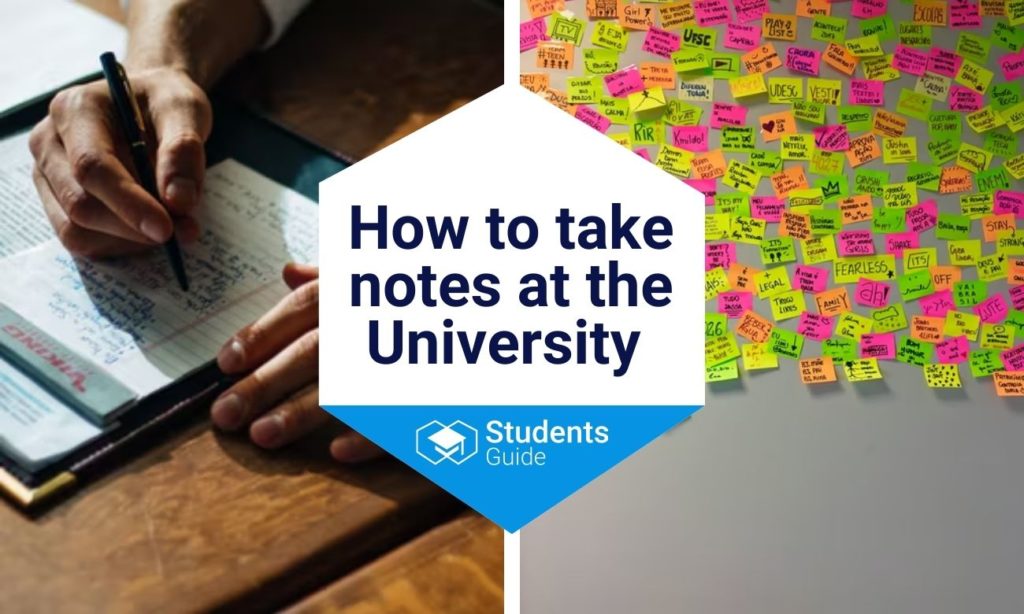If you are a University student, and you are struggling with taking notes at the University, here you should find a few tips that could ease your note-taking process! Keep reading, and I promise you are not going to regret it.
When taking notes, a lot of variables may affect your note-taking process. In particular, your levels of tiredness and concentration can reduce sharply your chances of success, as well as the lecturer’s fast voice pace and the medium through which your note-taking process is taking place.
First and foremost, the choice of the medium should depend on your preferences: you have to decide in advance whether you’re faster using electronic devices or manually. Once you have settled that, you need to know that if you choose to make use of electronic devices, you should adjust the software to take notes according to the subject at hand. For instance, if you were to write down notes in the field of humanities, the standard word document should be sufficient; however, were you to take notes in statistics, you might want to use an excel page or Latex, and so on.
Moreover, specific note-taking software exists on the market, like Evernote or Notion.
Generally speaking, as you should have already understood, there is some margin of manipulation.
Now, let’s find out together the dos and don’ts of taking University notes!

1) Choose the most productive medium for you
As aforementioned before, the first choice you have to make regards the medium you will employ in your note-taking process. You might want to decide wisely whether to use a paper-based or a computer-based supporting device.
2) Software
While taking notes, if you decide to make use of electronic devices instead of paper, you should also be careful with the choice of your supporting software: software is designed to meet specific needs. Therefore, it is likely that programs such as Excel and Latex will be more suitable for reporting graphics, figures, and statistics while writing software such as Microsoft Word for theoretical subjects.
3) Keywords
Were you to have embarked on a note-taking experience, you should be aware of the fact that you cannot write down everything that is being said in class! So, note down the most important sentences and keywords that can be helpful for you to remember the key concepts.
4) Abbreviation, signs, and symbols
In some professions, it is required to be able to write down large amounts of texts within a brief period of time. For instance, interpreters need to note down and remember very long texts and translate them into the target language requested. Therefore, they need to develop their own way to take notes using abbreviations, signs, and symbols, as well as be able to use the already existing ones.
Hence, you might not be an interpreter or become one, but in note-taking, it is of the utmost importance to develop a personal system of abbreviations, symbols, and signs that works well to render the process faster.
For instance, the symbol “?” could always mean “question” in your system, “++” could be corresponding to “importance”, and so on: this sentence “the most important question scientists are trying to address…” could be easily converted into “++ ? scientists”
5) Highlight, underline, capitalise
Lecturers often tend to stress certain words and leave others in the shadows. Make sure to highlight the correct ones in your note to ease your studying process.
6) Get rid of distractions!
When taking notes, make sure that all the potential distractions are inactivated and harmless. For instance, you might want to put your smartphone in your bag and leave it there for the duration of all lessons!
7) How to foster concentration
There are some methods that could foster your concentration: be sure that you have rested properly before class; suit yourself with a cup of coffee or tea, and remain hydrated; take some breaks during class if you feel overwhelmed.
8) The proper seat
It is also important to choose the correct seat from which to follow the lesson. Try to avoid sitting in the back seats, from where it is often harder to follow. Pick the most comfortable place for you, according to your needs!
9) Ask wise questions
If you haven’t got the point of a concept, please ask the lecturer to repeat that concept: there’s no need to fear to ask. Lecturers appreciate when students ask for clarifications, as it shows that they are actually following the lesson.
10) Peer review online and social networks
I bet that you possess at least a profile on a social network: social networks could actually be the place where to discuss academic stuff!
Indeed, if you haven’t understood a concept properly, start a conversation on a social network platform, and you will find out that peer review can be very helpful!
Moreover, there exist different communities online, which focus on a specific topic or subject: go check them!
I hope these guidelines will help you overcome your note-taking difficulties, and feel free to comment and leave your feedback!
